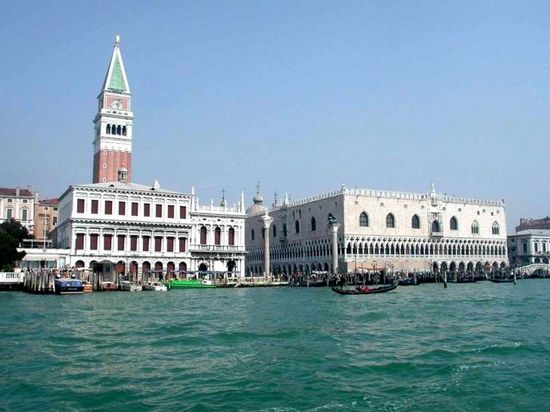
At last they got it right, and the old motto “better late than never” definitely applies here:
Left and
honesty, in Italy, are not synonymous, not anymore. So spoke
the Economist, despite its distrustfulness, if not its ill-concealed hostility, towards Silvio Berlusconi and the ruling center-right coalition, and despite what Walter Veltroni, leader of Italy’s main opposition Democratic Party, recently asserted about his own party (“a party of good people”).
Italy’s center-left, writes the Economist, may be “a bit dull and worthy, and somewhat tarnished by the communist past of many of its leaders (including Mr Veltroni),” but “it has always seemed fundamentally honest.” Yet …
in little more than a month, that benign view has been swept away in a slew of prosecutors’ warrants and summonses. On January 5th the centre-left mayor of Naples, Rosa Russo Iervolino, unveiled a new and reshuffled city administration. There were six new faces in her 16-strong team. Four of their predecessors had been arrested on suspicion of taking part in what prosecutors claim was a plan for the “systematic looting” of public funds. A fifth had committed suicide after he too came under investigation for corruption and other alleged offences.
The scandal in Naples, which revolves around a €400m ($545m) public-services contract, is the most substantial but by no means the only one to have assailed the opposition. Since the end of November, centre-left politicians have been put under suspicion, or even arrest, in seven other cities and regions.
So, yet another myth—and that of the honesty of the left was a very though and persistent one—has been swept into the trash can. Not that, of course, such scandals are in my opinion a good thing in themselves, nor do I rejoice because my political opponents are in a very bad fix. Rather I rejoice because, if political myths can be understood as “narratives through which we orient ourselves, and act and feel about our political world,” as political philosophy scholar
Chiara Bottici puts it, they—or at least a certain kind of them—often are nothing more than “comedy of misunderstandings.” That is to say that they are more or less useless, if not pernicious, and that we can do well without them.
But that of the honesty of the left wasn’t the only myth to collapse, there was also that of the honesty of Italy of Principles, the party led by Antonio Di Pietro, a former prosecutor who leapt to national prominence in the days of
Mani pulite (“clean hands”), the nationwide Italian judicial investigation into political corruption held in the 1990s, which led to the demise of the so-called First Republic, resulting in the disappearance of many parties. In fact, Mr Di Pietro too has now had his wings clipped:
His son, Cristiano, a provincial lawmaker, quit the party after he was caught up in the Naples sleaze inquiry. Transcripts were leaked of telephone conversations in which he seemed to be asking for jobs and advancement for his friends.
Who would ever have predicted that? Very few, actually. I mean, very few would have thought that things came before the courts—not just that the left might be involved in bribery or other official corruption, and believe me, there is a difference …—, given that both the left and Di Pietro’s party had always been in very good terms with the judges. But things have changed in the last couple of years, and some taboos seem to have fallen away in certain public realms, especially in the judicial one. That’s also why what looks like bad news could actually turn out to be a very exciting time, even though not for the left itself, nor for Di Pietro. Yeah, now everybody knows—even the Economist (better late than never!)—that they are humans, too, after all.
Do you like this blog? Vote for me for BEST EUROPEAN BLOG (Non UK) 2008. Voting ends Monday, January 12 at 22h00 GMT (11 pm in Rome, 5 pm in New York, 2 pm in LA) |

 And five centuries after his birth he not only remains—thanks to his exceptional buildings, which somehow encapsulate the legacy of Italian Renaissance architectural practice—Europe’s greatest architect, he also deeply influenced the theory and understanding of architecture through his celebrated treatise I Quattro Libri dell'Architettura, published in Venice in 1570.
And five centuries after his birth he not only remains—thanks to his exceptional buildings, which somehow encapsulate the legacy of Italian Renaissance architectural practice—Europe’s greatest architect, he also deeply influenced the theory and understanding of architecture through his celebrated treatise I Quattro Libri dell'Architettura, published in Venice in 1570.

























 It’s a commonplace that Italy is a beautiful but strange, unmanageable, unreliable country, and that it was just its own oddness that recently led—after a spectacular post-war growth record—to a gradual impoverishment.Italy and its economy are like the Titanic hitting the iceberg,” said once Gianni De Michelis, deputy prime minister in 1988 and 1989. An he was right, at least in part.
It’s a commonplace that Italy is a beautiful but strange, unmanageable, unreliable country, and that it was just its own oddness that recently led—after a spectacular post-war growth record—to a gradual impoverishment.Italy and its economy are like the Titanic hitting the iceberg,” said once Gianni De Michelis, deputy prime minister in 1988 and 1989. An he was right, at least in part.
